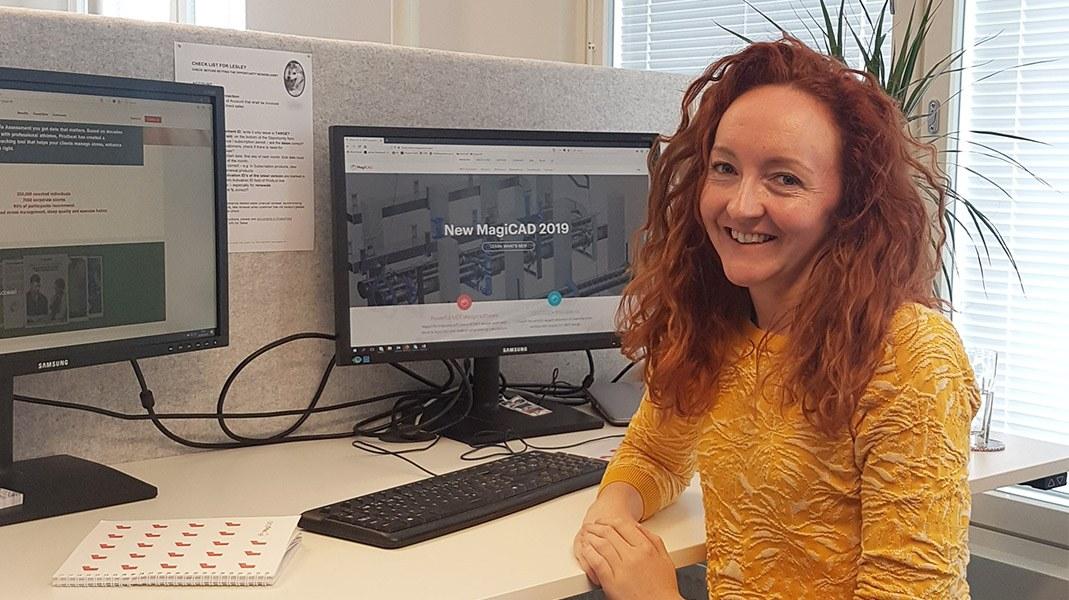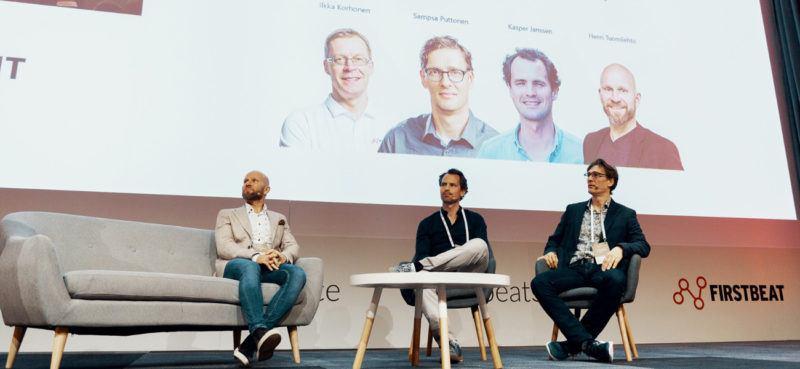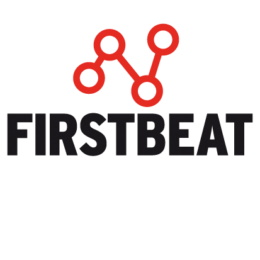
86 Progman employees recently volunteered to take part in a Firstbeat Lifestyle Assessment as part of the ongoing ‘Well-being at work’ initiative. The idea was to help them discover and pinpoint factors in their personal routine that affected their individual and occupational well-being.
Firstbeat’s Lifestyle Assessment is a professional grade coaching tool which transforms heartbeat data into personalized information on exercise, stress and recovery. It reveals how the body reacts to 24-hour daily life and connects the dots between lifestyle and well-being, helping to identify steps towards a healthier, fitter and more productive life.
Lesley Kiernan, MagiCAD Channel Area Manager for Central and Eastern Europe, was amongst the volunteers. We spoke to Lesley about her experience and what she learned from her Firstbeat Lifestyle Assessment:
Why did you decide to take part in a Firstbeat Lifestyle Assessment?
I was offered the chance to participate in a Firstbeat Lifestyle Assessment as part of the Well-being at work initiative. I’ve never had the chance to participate in something like that before, and it was interesting to have the opportunity to examine the truth about my lifestyle versus my perception of it. My job is quite sedentary, which concerns me, so I wanted to learn how much that affects me and how to make positive changes.
How did you view your own lifestyle before conducting the Lifestyle Assessment?
I would say I lead a relatively healthy lifestyle. I have a husky which means I’m on the move a lot. Helsinki is a very walkable city and I take advantage of that daily. I’m social, I eat healthily, I let off steam at the gym regularly, so I expected the Lifestyle Assessment to confirm my perceptions of myself as a moderately healthy person for my age.
How did you find wearing the Bodyguard 2 device during the monitoring period?
The device was funny to wear at first because I’ve never done anything like this before. But, after I’d finished taking selfies of my new toy, the novelty wore off and I didn’t really notice it that much.
What did your individual results show? Were you surprised by any of the data?
My results had a few surprises in hold for me, for example, I sleep terribly. I’m not a morning person and I rely quite heavily on coffee (no wonder!) and my results helped me to understand why. I actually thought I must be reading my results incorrectly at first, but a feedback session with a Firstbeat specialist confirmed it. That was more a shock than a surprise and it made me reflect on how to improve my sleep.
What would you say is the biggest benefit from taking part in the Lifestyle Assessment?
The biggest benefit was being able to measure my different activities against each other and see what was more beneficial to my health. For example, I knew my HIIT cardio class was good for me, but I hadn’t realised how effective it was compared to my other workouts. Now when I’m struggling during the class, I remind myself how good this is for me, and it gives me a bit more motivation to push through. My sleep results also made a big impact. I knew I wasn’t getting enough sleep but having a meeting with a specialist to go over it really brought it home to me that I need to make changes there. The good news is that they had plenty of tips for me.
How has taking part in a Lifestyle Assessment helped you make changes in your lifestyle?
One specific change I’ve made is that I’m focusing on my sleep. During the one-on-one meeting with a Firstbeat specialist, I received some workable tips to implement cleaner sleep hygiene. E.g. I’ve started to go to bed just a little bit earlier every night. It’s a lot easier to implement 5 minutes earlier each week for a month, than 20 minutes earlier immediately. As tempting as it is, I try to not to use my phone in the 30minutes leading up to bedtime. And I try to view “bedtime” as an adult thing that adults do for their health, and not something boring just for kids. To be honest I still find it boring and restrictive, but I do feel fresher in the morning.
Would you recommend the Lifestyle Assessment to your colleagues?
The Lifestyle Assessment is available to all Progman employees so most of us are taking part and learning how to improve our lifestyles. It’s fun to discuss together our different lifestyles and learn from each other. I’m also recommending this to some of my friends because it has been a really interesting and useful experience.
We’ve heard about Lesley’s experience, but what did the overall group results show?
Exercise – Of the 86 people who took part, the data showed only 40-percent were ‘Physically active enough to get health benefits’. Meanwhile, 36-percent were ‘Moderately physically active’ and 24-percent ‘Were not physically active enough’. The average result of the group placed their physical activity levels as ‘Moderate’.
Stress – Although one-third of staff identified as feeling stressed, the measurement results did show that stress and recovery were in balance for 85-percent of the group. 13-percent were found to have elevated amounts of stress and further consultation was recommended for the 2-percent who had significantly elevated amounts of stress. Overall, this meant the group’s average result was ‘Good’.
Sleep – Lifestyle Assessment results found that, among the 86 Progman staff, 57-percent were only getting moderate (47-percent) or poor (10-percent) recovery during sleep. The data provided led 30-percent of participants to set a goal related to sleep and recovery after completing the assessment.
In total, Progman staff set 213 goals after receiving their Lifestyle Assessment report. The three most popular were:
- I will attempt to go to bed early enough to get enough sleep
- I will attempt to engage in physical activity at least X times per week
- I will remember to drink and eat regularly, when I’m busy
These may sound like simple goals, but it can be easy to convince yourself you’re getting enough sleep or exercising as much as you’d like when the reality may be different. Seeing personal data showing an accurate representation of your routine can open your eyes to areas that you can address, letting you improve personal well-being in the process.
If you liked this article, you should subscribe to our mailing list
You might also be interested in

Corporate Wellness and World Class Athletes: Same Technology, Different Uses
Monitoring internal physiology is an effective tool in the pursuit of performance in professional sports, but also in the office.

Manage Your Energy, Not Your Time
In this webinar, Rachael will take a closer look at factors that drain, and replenish our energy, backed by collected Firstbeat Lifestyle Assessment data.

Firstbeat HRV Summit 2019: Key Takeaways on Sleep and Recovery
The Firstbeat HRV Summit 2019’s Fitness & Training session welcomed a multi-national group of speakers. Read the key takeaways on sleep and recovery topics.

